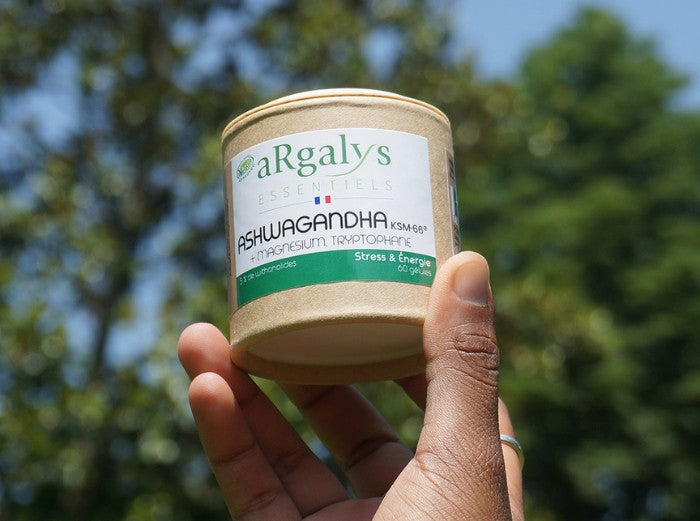Ashwagandha (Withania somnifera) is a key medicinal plant in Ayurveda, the traditional Indian preventive medicine, used for over 3,000 years to strengthen vitality, improve stress resistance, and stabilize emotional balance.
In recent years, it has also become very popular in the West for its potential in managing chronic stress and anxiety.
In a context where stress-related disorders affect an increasing portion of the population, research on adaptogenic plants is multiplying. Among them, Ashwagandha stands out for a combination of physiological and neurobiological effects that are now well documented.
What are its mechanisms of action? What do scientists say? Under what conditions can it be used safely? This article offers a synthesis of the essentials to know.
What is an Adaptogenic Plant?
The term adaptogen refers to a natural substance capable of helping the body adapt to stressful situations, whether physical, psychological, or environmental.
Adaptogenic plants as a whole act in multiple and often non-specific ways, but studies also show their frequent impact on the secretion of Cortisol, the stress hormone, regulated by the hypothalamic-pituitary-adrenal complex (“the HPA axis”).
Ashwagandha is one of the most studied adaptogens to date. Its actions have been demonstrated on the adrenal glands, the central nervous system, and chronic inflammation induced by stress.
This observed effectiveness explains the popularity of Ashwagandha for restoring neuro-hormonal balance and, more generally, making the body more resistant to stress.
How Does Ashwagandha Act on Stress?
The activity of Ashwagandha is mainly based on a group of natural molecules called withanolides, present throughout the plant but more concentrated in its roots. The withanolides act at several levels to increase resistance to stress and anxiety.
Modulation of GABA receptors: GABA (gamma-aminobutyric acid) is the main inhibitory neurotransmitter in the brain. It plays a central role in regulating anxiety by limiting neuronal excitability. The withanolides enhance GABAergic signaling, inducing a calming effect without excessive sedation.
Regulation of cortisol: In cases of prolonged stress, cortisol production increases chronically, disrupting mood, sleep, concentration, and immunity. Ashwagandha helps stabilize cortisol production by reducing the harmful peaks observed in chronic stress.
Antioxidant and anti-inflammatory effects: Chronic stress promotes low-grade inflammation, often silent but harmful. Ashwagandha helps slow this process by reducing the activity of certain pro-inflammatory cytokines.
What Do Clinical Studies Show on Anxiety and Stress?
Several controlled studies have confirmed the anxiolytic and anti-stress effects of Ashwagandha, particularly when used in standardized root extract form (with measured doses of withanolides).
Proven Effectiveness Through Clinical Data
A 2021 meta-analysis covering 12 randomized clinical trials showed a significant reduction in perceived stress and anxiety among participants who received Ashwagandha, compared to placebo [3]. The effects were observed with doses ranging from 250 to 600 mg/day, over periods of 4 to 8 weeks.
Patients reported improved sleep, reduced irritability, and better concentration, validated by psychometric scales such as the PSS (Perceived Stress Scale) and the GAD-7 (Generalized Anxiety Disorder scale).
Ashwagandha and Cortisol Reduction: A Well-Established Relationship
A double-blind study conducted on 64 adults revealed an average 23% decrease in salivary cortisol levels after 60 days of supplementation with 600 mg/day of a standardized root extract [2].
This reduction is accompanied by improved sleep quality, better mental recovery, and decreased chronic fatigue—symptoms often associated with an imbalance of the HPA axis.
Ashwagandha: Which Form to Choose and at What Dosage?
It is the dose and the bioavailability of withanolides that determine effectiveness.
Raw powders have low content (less than 1%) and poor bioavailability; non-standardized extracts are more concentrated but vary in potency and are often produced through solvent-based extraction processes.
A patented water extraction process that appeared a few years ago has set a new quality standard: the KSM-66® form. It is now the most widely used extract in clinical trials: it contains 5% withanolides, no harmful residues, and good bioavailability.
For optimal effectiveness, a daily intake for 6 to 8 weeks is recommended, with a dose corresponding to 300 to 1000 mg of dry plant (at 5% withanolides). To deepen your knowledge, consult our complete guide to choosing the best form of Ashwagandha.
Precautions, Contraindications, and Potential Side Effects
Ashwagandha is generally well tolerated, but it is not recommended in cases of hyperthyroidism, pregnancy, or when combined with certain sedative medications. Some side effects may occur in sensitive individuals: digestive issues, drowsiness, or headaches. It is advisable to consult a healthcare professional before beginning prolonged supplementation.
Conclusion
Thanks to its targeted action on the neuro-hormonal pathways of stress, Ashwagandha appears to be one of the most comprehensive natural remedies for reducing chronic stress and alleviating moderate anxiety. Its effectiveness is now well documented through rigorous clinical trials, and its good tolerance makes it an interesting alternative to conventional approaches.
To optimize its effects, the choice of a standardized root extract, such as KSM-66®, is essential, combined with an appropriate dosage and regular intake over several weeks.
At Argalys, we have chosen to combine Ashwagandha KSM-66®, magnesium bisglycinate, and L-tryptophan in a synergistic formula designed to strengthen stress adaptation, promote neuromuscular relaxation, and support emotional balance on a daily basis.
References
-
Panossian A, Wikman G. Effects of adaptogens on the central nervous system and the molecular mechanisms associated with their stress-protective activity. Pharmaceuticals. 2010;3(1):188–224.
-
Chandrasekhar K, Kapoor J, Anishetty S. A prospective, randomized double-blind, placebo-controlled study of safety and efficacy of a high-concentration full-spectrum extract of Ashwagandha root in reducing stress and anxiety in adults. Indian J Psychol Med. 2012;34(3):255–262.
-
Lopresti AL et al. A systematic review and meta-analysis of the effectiveness of ashwagandha (Withania somnifera) for the treatment of anxiety. J Clin Med. 2021;10(8):1991.
-
Salve J, Pate S, Debnath K, Langade D. Adaptogenic and anxiolytic effects of ashwagandha root extract in healthy adults: a double-blind, randomized, placebo-controlled clinical study. Cureus. 2019;11(12):e6466.
 04 74 03 98 80
04 74 03 98 80









